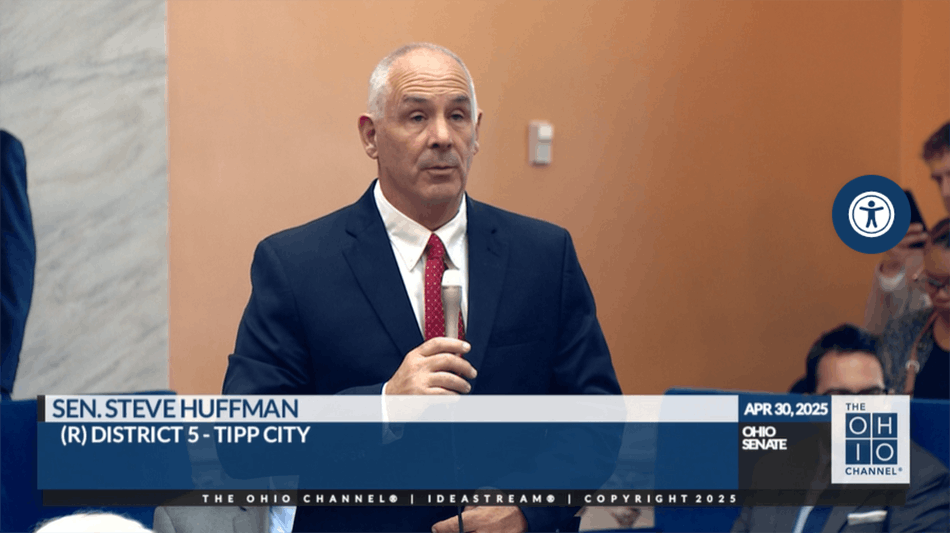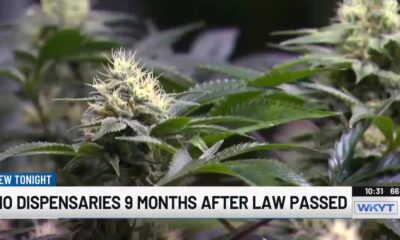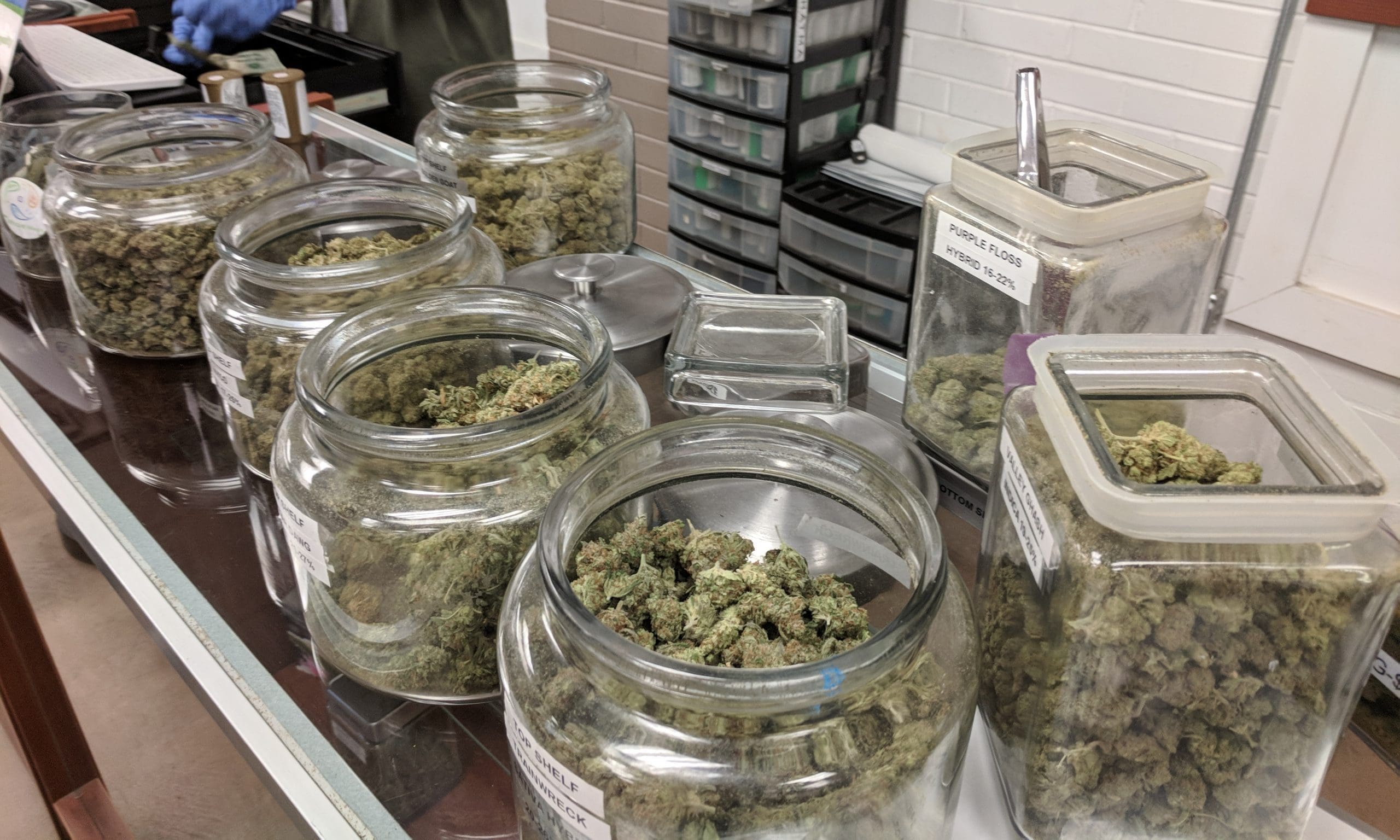featured
Ohio Senate Passes Bill to Limit Hemp Product Sales to Licensed Dispensaries, Liquor Stores
Published
5 months agoon

The Ohio Senate unanimously passed legislation on April 30 that would remove intoxicating hemp products from corner stores and require that they be sold exclusively in licensed cannabis dispensaries, with some exceptions for liquor establishments.
The legislation, Senate Bill 86, comes as Gov. Mike DeWine and Ohio’s lawmakers in Columbus continue to warn about the dangers of unregulated and untested hemp-derived THC products—such as delta-8 THC gummies—that are often sold in gas stations, vape or smoke shops, and convenience stores throughout the state.
Under S.B. 86, sponsored by Sen. Steve Huffman, R-Tipp City, intoxicating hemp products are defined as containing more than 0.5 milligrams per serving or 2 milligrams per package of delta-9 THC—a naturally occurring compound in cannabis and hemp—or any amount of a synthetic THC, such as delta-8 THC.
In addition, any product containing more than 0.5 milligrams per package of “total non-delta-9 THC” would be considered an intoxicating hemp product—an effort by lawmakers to close what some refer to as a THC acid (THCA) loophole.
RELATED: THCA in the Farm Bill: Amendment Goes Far Beyond Closing ‘Loopholes’
Intoxicating hemp products that can be ingested, inhaled, snorted, sniffed or used sublingually would be restricted to licensed cannabis dispensaries exclusively under the bill.
Meanwhile, topicals and “drinkable cannabinoid products” (aka infused beverages) could be sold by retailers with state liquor licenses—in addition to licensed dispensaries. The legislation defines a drinkable cannabinoid product as containing no more than 0.3% THC and no more than:
- 0.42 milligrams of THC per fluid ounce
- 0.5 milligrams of delta-9 THC per serving
- 12 fluid ounces per serving
- 2 milligrams of delta-9 THC per container
- 48 total fluid ounces in all containers included in a package
- 4 servings per container
These infused beverage products could not contain any amount of synthetic THC, such as delta-8, under the bill.
“Due to the lack of regulation, the intoxicating hemp industry has been able to confuse Ohio consumers and law enforcement by marking themselves as dispensaries with recreational marijuana,” Huffman said before a 33-0 floor vote to pass his legislation on Wednesday.
Huffman pointed to a VIP Smoke Shop that law enforcement officials raided in March in Norwood, located just outside of Cincinnati, after the Warren County Drug Task Force executed a search warrant. The shop’s co-owners, brothers Wael Sharaydeh and Ismail Sharida, were indicted on 60 criminal counts in October 2024, WKRC reported.
“The raid was part of an ongoing investigation involving the same two brothers who owned more than a hundred VIP Smoke Shops that were charged with drug trafficking in Butler County,” Huffman said. “These types of places are becoming more and more prevalent, causing consumers to think they’re buying well-tested, well-regulated marijuana that supports Ohio’s economy when they’re not.”
To suppress the illicit market, the senator said his bill prohibits hemp products that are not sold in licensed dispensaries.
S.B. 86 would also establish a 10% tax on intoxicating hemp products to create parity with Ohio’s 10% excise tax on adult-use cannabis sales. In addition, it would establish testing lab standards, packaging and labeling requirements, and age-verification regulations. The bill also would levy an excise tax on a manufacturer’s sale of an infused beverage to distributors or retailers equal to $3.50 for each gallon sold.
Sen. Shane Wilkin, R-Hillsboro, the bill’s other primary sponsor, said S.B. 86 aims to close loopholes that have allowed intoxicating hemp products to land in the hands of Ohio’s youth. Wilkin explained during this week’s floor session that unregulated intoxicating hemp products are sometimes packaged to resemble popular cereal or candy brands that have cartoon characters attractive to kids.
“It is marketed to kids,” Wilkin said. “They’re not tested. We don’t know what’s in them. And, unfortunately, they are without question ending up in our kids’ hands. And that’s not right.”
Sen. Bill DeMora, D-Columbus, voted in favor of passing S.B. 86 during April 30’s floor session, explaining that he supports the common-sense public safety measures included in the bill. However, he said he hopes the Ohio House amends the bill.
Specifically, DeMora said he has reservations with the legislation’s “strict” limits on infused beverages, which represent one of the fast-growing product segments in the industry.
“Many people have invested in these growing industries, and I think our bill is a little too regulatory when it comes to these drinks,” DeMora said. “I have several constituents in my district that are in these businesses who were worried that their businesses were going to be put out completely by what these regulations were going to do.”
The legislation also establishes that selling an intoxicating hemp product or a drinkable cannabinoid product in violation of the regulatory standards outlined in the bill would constitute a first-degree misdemeanor on the first offense and a fifth-degree felony on each subsequent offense.

Author: mscannabiz.com
MScannaBIZ for all you Mississippi Cannabis News and Information.
You may like
-


Watertown could create new rules for cannabis shops
-


Rhode Island Opens Applications for 24 Adult-Use Dispensary Licenses
-


Kentucky still waiting on medical marijuana dispensaries 9 months after law passed
-


Can LSD Battle Anxiety? The Answer Is Yes, According to Science
-


Six hurt in shooting at marijuana event in SF's Bayview
-


Kentucky Medical Marijuana Dispensaries Should Be Stocked With Products Ready For Sale By Next Month, Top State Official Says
featured
Rhode Island Opens Applications for 24 Adult-Use Dispensary Licenses
Published
43 minutes agoon
September 15, 2025
[PRESS RELEASE] – WARWICK, R.I., Sept. 12, 2025 – The Cannabis Control Commission (CCC) opened the application period for adult-use cannabis retail licenses, marking the beginning of the largest expansion to Rhode Island’s cannabis industry. The commission is authorized under the Rhode Island Cannabis Act to license up to 24 retail establishments statewide, divided equally across six geographic zones, making this announcement a defining moment in shaping the state’s cannabis marketplace.
“Today’s announcement represents years of work, collaboration and preparation to ensure Rhode Island has a cannabis marketplace that is safe, transparent, and equitable,” CCC Chairperson Kim Ahern said. “The release of this application and launch of our submission portal is not only about opening doors for businesses but about creating meaningful opportunities for Rhode Islanders while keeping public health and public safety at the center of everything we do.”
With only 24 retail licenses available statewide, the launch of the application process is expected to draw significant interest from prospective applicants. Together with the Social Equity Applicant Status Certification Portal, which opened in August, the application process reflects the CCC’s deliberate steps toward building a cannabis industry that prioritizes economic opportunity, equity and fairness in Rhode Island.
“Rhode Island’s cannabis market is poised for growth, and this application is helping us do exactly that,” Gov. Dan McKee said. “As we expand the cannabis industry here in the Ocean State, we’re opening the doors to new investment, new good-paying jobs, and new opportunities for our economy.”
Adult-use retail licenses will authorize sales of cannabis products to adults 21 and older. By releasing the application and opening the submission portal simultaneously, the commission is providing applicants with a transparent process while reinforcing its commitment to accountability and access.
“Today’s release of the adult-use retail license application reflects the commission’s commitment to equity and accountability,” Commissioner Layi Oduyingbo said. “This framework provides applicants with the information they need while reinforcing our responsibility to safeguard public health and consumer safety.”
Commissioner Robert Jacquard said, “The commission aims to make this application process as business-friendly as possible, while upholding standards that will protect public health.”
To ensure the process is fair and accessible, the commission and Cannabis Office will provide technical assistance resources and ongoing guidance for prospective applicants. Applications will be accepted until 4 p.m. on Dec. 29, 2025.
“This is a milestone that reflects the dedication and perseverance of so many people,” Cannabis Office Administrator Michelle Reddish said. “From lawmakers and advocates to community members and our dedicated staff, countless individuals have helped build the foundation for this moment. By publishing the application today, we are taking a historic step toward building a cannabis marketplace that serves consumers, supports equity and advances public health in Rhode Island.”
The adult-use retail license application is available on the commission’s website at www.ccc.ri.gov/auapp.

Author: mscannabiz.com
MScannaBIZ for all you Mississippi Cannabis News and Information.
featured
Can LSD Battle Anxiety? The Answer Is Yes, According to Science
Published
2 hours agoon
September 15, 2025
Hands down, one of the drugs that has received the worst press in the decades marked by the War on Drugs has been LSD. All sorts of things have been said about this molecule: that it drives you crazy, or suicidal, that it remains stored in your body forever, that it irreparably damages the brain… Fortunately, we now have professionals investigating the matter, with a scientific perspective rather than a moralistic or prohibitionist one.
One of the latest findings on the subject seems to directly contradict one of the great myths about LSD: instead of leading to insanity, this compound could reduce anxiety. This is according to a study by Mind Medicine (MindMed) Inc., a biopharmaceutical company that has been researching psychedelic compounds for mental health for many years. While the preliminary results were released in 2022, they were officially published this month in the Journal of the American Medical Association.
This isn’t the first time MindMed has embarked on studying this topic: it had already achieved positive results with LSD for anxiety on another occasion. In fact, the FDA granted Breakthrough Therapy designation for generalized anxiety disorder (GAD) to the company’s proprietary drug candidate, MM120, a pharmacologically optimized formulation of LSD.
LSD and Anxiety: What the MindMed Study Says
The company conducted a multicenter, randomized, double-blind, placebo-controlled Phase 2b study at 22 outpatient psychiatric research centers in the US. The effects of a single dose of MM120 (lysergide D-tartrate, LSD) were analyzed in 198 adults with moderate to severe generalized anxiety disorder (GAD). Participants experienced sustained improvements in their condition over the 12-week observation period.
According to the company’s press release, this is the first randomized, placebo-controlled trial evaluating a single treatment at four dose levels (25, 50, 100, or 200 µg), without any psychotherapeutic intervention.
The optimal dose of MM120 was determined at 100 µg. This demonstrated a “clinically and statistically significant improvement vs. placebo, and a 65% clinical response rate and 48% clinical remission rate” at the end of the experiment.
Likewise, tolerance to the medication was positive, with the expected adverse effects of an LSD experience remaining mild to moderate and lasting only one day.
During the study, participants receiving medication for their condition had to discontinue such treatment under the supervision of the study professionals. Furthermore, on the day of dosing, they were offered “standardized music and eyeshades and could lie down, move freely around the room, read, write, or draw.” It should be noted that the study protocol explicitly prohibited participation in psychotherapy.
Dr. Maurizio Fava, one of the study’s authors, stated that “this study is a true turning point in the field of psychiatry… For the first time, LSD has been studied with modern scientific rigor, and the results are both clinically meaningful and potentially paradigm-shifting for the treatment of GAD. GAD affects 26 million adults in the U.S., yet no new medications have been approved since 2007—and first-line treatments fail 50% of patients.”
Thus, scientific innovation continues to advance against the willful ignorance of prohibitionists, working tirelessly to ensure patients have access to the relief that traditional therapies fail to provide.
This article was first published on El Planteo.

Author: mscannabiz.com
MScannaBIZ for all you Mississippi Cannabis News and Information.
featured
Kentucky Medical Marijuana Dispensaries Should Be Stocked With Products Ready For Sale By Next Month, Top State Official Says
Published
3 hours agoon
September 15, 2025
Kentucky’s top medical marijuana regulator said he expects that dispensary shelves will be stocked with products ready for sale to patients by next month.
Two of the state’s 16 medical cannabis cultivators are now operational, according to Cannon Armstrong, executive director of Kentucky’s Office of Medical Cannabis (OMC).
“If everything goes according to plan for them, I think that they’ll have medical cannabis that will be ready to harvest and be put on the shelf, you know, by October,” he told Spectrum News 1. “So we’re moving and we’re finally getting to a point where we’re, these patients are going to receive this medication sooner than later.”
Armstrong predicted that the first sales will likely occur at a dispensary in Beaver Dam called The Post.
“I think you’re going to see the first products out there based upon just how it’s shaken out,” he said. “You know, someone may step up their timeline and may get out there before that or get product from there and place it somewhere else in the state.”
As of now, OMC has approved more than 19,000 patients certifications, Armstrong said.
He added that medical cannabis supplies should be relatively scarce as the market first launches, and said that as a result initial prices will be higher than they eventually will be.
Earlier this month, Gov. Andy Beshear (D) said he thought medical marijuana would be available to Kentucky patients by the end of 2025.
“The medical marijuana program is moving forward,” he said at a press briefing at the time.
“I think most of our dispensaries now have their home address [and] are set about where they’re going to be, but [for] some of the inspections that have to happen in dispensaries, they have to have product that’s there,” he said. “So I do believe they’ll be operating before the end of the year.”
Those comments came roughly a month after the governor announced that the state’s first medical cannabis dispensary has officially been approved for operations, calling it “another step forward as we work to ensure Kentuckians with serious medical conditions have access to the medicine they need and deserve.
He previously touted an earlier “milestone” in the state’s forthcoming medical marijuana program, with a licensed cultivator producing “the first medical cannabis inventory in Kentucky history.”
Beshear’s office has said that other cannabis licensees, including processors and testing labs, are expected to become operational soon.
In July, Beshear sent a letter to President Donald Trump, urging him to reject congressional spending bill provisions that would prevent the Justice Department from rescheduling marijuana.
In the letter to the president, he emphasized that a pending proposal to move cannabis from Schedule I to Schedule III under the Controlled Substances Act (CSA) is something “you supported in your presidential campaign.”
“That process should be allowed to play out. Americans deserve leadership that won’t move the goalposts on them in the middle of the game,” Beshear said, noting that he was among the tens of thousands who submitted public comments in favor of the reform after it was initiated under the Biden administration, “demonstrating broad public interest in rescheduling.”
“I joined that effort because this is about helping people. Rescheduling would provide suffering patients the relief they need,” the governor said. “It would ensure communities are safer—because legal medical products reduce the illicit market. It would provide new, meaningful research on health benefits.”
Beshear also mentioned a letter to DEA he signed onto last year urging rescheduling, “because the jury is no longer out on marijuana. It has medical benefits.”
Back on the state level, the governor recently said he acknowledges that “it’s taken longer than we would have liked” to stand up the industry since he signed medical marijuana legalization into law in 2023.
In recognition of that delayed implementation, he recently signed an executive order to waive renewal fees for patients who get their cards this year so that they don’t get charged again before retailers open. And another order he signed providing protections for qualified patients who obtain medical marijuana outside of Kentucky “will stay in place.”
Beshear separately announced in May that the state has launched a new online directory that lets people see where medical cannabis dispensaries will be opening near them.
He emphasized that the state has been working to deliver access to patients “at the earliest possible date,” and that involved expediting the licensing process. The governor in January also ceremonially awarded the commonwealth’s first medical marijuana cards.
—
Marijuana Moment is tracking hundreds of cannabis, psychedelics and drug policy bills in state legislatures and Congress this year. Patreon supporters pledging at least $25/month get access to our interactive maps, charts and hearing calendar so they don’t miss any developments.![]()
Learn more about our marijuana bill tracker and become a supporter on Patreon to get access.
—
Meanwhile, the governor sent a letter to Kentucky’s congressional delegation in January, “urging them to take decisive action to protect the constitutional rights of our law abiding medical cannabis patients” by repealing the federal ban on gun possession by people who use marijuana.
That came after bipartisan Kentucky senators filed legislation that similarly called on the state’s federal representatives to take corrective action, which Beshear said he supports but would like to see even more sweeping change on the federal level.
The federal Bureau of Alcohol, Tobacco, Firearms and Explosives (ATF) warned Kentucky residents late last year that, if they choose to participate in the state’s medical marijuana program, they will be prohibited from buying or possessing firearms under federal law.
As far as the implementation of the state’s medical cannabis law goes, Beshear said in his State of the Commonwealth address in January that patients will have access to cannabis sometime “this year.” He also later shared tips for patients to find a doctor and get registered to participate in the cannabis program.
Health practitioners have been able to start assessing patients for recommendations since the beginning of December.
While there currently aren’t any up-and-running dispensaries available to patients, Beshear has further affirmed that an executive order he signed in 2023 will stay in effect in the interim, protecting patients who possess medical cannabis purchased at out-of-state licensed retailers.
During last year’s November election, Kentucky also saw more than 100 cities and counties approve local ordinances to allow medical cannabis businesses in their jurisdictions. The governor said the election results demonstrate that “the jury is no longer out” on the issue that is clearly supported by voters across partisan and geographical lines.

Author: mscannabiz.com
MScannaBIZ for all you Mississippi Cannabis News and Information.

Watertown could create new rules for cannabis shops

Rhode Island Opens Applications for 24 Adult-Use Dispensary Licenses

Kentucky still waiting on medical marijuana dispensaries 9 months after law passed

Can LSD Battle Anxiety? The Answer Is Yes, According to Science

Six hurt in shooting at marijuana event in SF's Bayview

Kentucky Medical Marijuana Dispensaries Should Be Stocked With Products Ready For Sale By Next Month, Top State Official Says

Deputies: 3,500 child sex abuse images, marijuana grow operation found in NC home raid

Regulators Ready to Enforce Cannabis Laws on Hemp THC Retailers in Maryland

California reaps over $250 million from 2nd Quarter cannabis sales

Meet the World’s First Cannabis Rugby Team: Crewmen 7’s Tackle Stigma Head-On

Texas Supreme Court Refuses To Take Up Marijuana Case Challenging State’s Rejection Of Local Decriminalization Law

California Passes Bill to Ban Intoxicating Hemp Products Outside Cannabis Market

Pending Federal Hemp Legislation Could Reshape The Legal Industry By Banning Some Products (Op-Ed)

Verano Proposes to Redomicile Parent Company From British Columbia to Nevada

8,000 cannabis plants seized from illegal Bradford grow-op

New York Lawmakers Schedule Psychedelics-Focused Hearing To Discuss ‘Medicinal Value And Risks’ Of Psilocybin

Curaleaf Opens Cannabis Dispensaries in Florida, Ohio

How to Protect Your Outdoor Cannabis Crops From Pests

Feds provide anti-cannabis group a platform to bash legalization (Newsletter: September 15, 2025)

Dozen arrested after south Mississippi bust for illegal sales to underage customers

The Toking Traveler: Why Amsterdam Weed Is Mostly Boof

Arkansas Medical Marijuana Sales Are On Track To Set A New Annual Record

When Cannabis Brands Blur Into Youth Culture, Regulators Notice: Lessons From Tobacco’s Past

Rhode Island Marijuana Dispensary License Application Process Officially Launches

Alert: Department of Cannabis Control updates data dashboards with full data for 2023

Connecticut Appoints The US’s First Cannabis Ombudsperson – Yes there is a pun in there and I’m Sure Erin Kirk Is Going To Hear It More Than Once!

5 best CBD creams of 2024 by Leafly

EU initiative begins bid to open access to psychedelic therapies
New Study Analyzes the Effects of THCV, CBD on Weight Loss

Free delta-9 gummies from Bay Smokes

Discover New York’s dankest cannabis brands [September 2024]

5 best autoflower seed banks of 2024 by Leafly

Press Release: CANNRA Calls for Farm Bill to Clarify Existing State Authority to Regulate Hemp Products

Curaleaf Start Process Of Getting Their Claws Into The UK’s National Health System – With Former MP (Resigned Today 30/5/24) As The Front Man

May 2024 Leafly HighLight: Pink Runtz strain

Local medical cannabis dispensary reacts to MSDH pulling Rapid Analytics License – WLBT

Recreational cannabis on ballot for third time in South Dakota

5 best THC drinks of 2024 by Leafly

Horn Lake denies cannabis dispensary request to allow sale of drug paraphernalia and Sunday sales | News

Mississippi city official pleads guilty to selling fake CBD products

6 best CBD gummies of 2024 by Leafly

Nevada CCB to Accept Applications for Cannabis Establishments in White Pine County – “Only one cultivation and one production license will be awarded in White Pine County”

The Daily Hit: October 2, 2024

5 best delta-9 THC gummies of 2024 by Leafly

Weekly Update: Monday, May 13, 2024 including, New Guide for Renewals & May Board meeting application deadline

PRESS RELEASE : Justice Department Submits Proposed Regulation to Reschedule Marijuana

5 best THCA flower of 2024 by Leafly

People In This State Googled ‘Medical Marijuana’ The Most, Study Shows
Trending
-

 California Cannabis Updates1 year ago
California Cannabis Updates1 year agoAlert: Department of Cannabis Control updates data dashboards with full data for 2023
-

 Breaking News1 year ago
Breaking News1 year agoConnecticut Appoints The US’s First Cannabis Ombudsperson – Yes there is a pun in there and I’m Sure Erin Kirk Is Going To Hear It More Than Once!
-

 best list1 year ago
best list1 year ago5 best CBD creams of 2024 by Leafly
-

 Business12 months ago
Business12 months agoEU initiative begins bid to open access to psychedelic therapies
-

 cbd1 year ago
cbd1 year agoNew Study Analyzes the Effects of THCV, CBD on Weight Loss
-

 Bay Smokes1 year ago
Bay Smokes1 year agoFree delta-9 gummies from Bay Smokes
-

 cannabis brands12 months ago
cannabis brands12 months agoDiscover New York’s dankest cannabis brands [September 2024]
-

 autoflower seeds12 months ago
autoflower seeds12 months ago5 best autoflower seed banks of 2024 by Leafly





